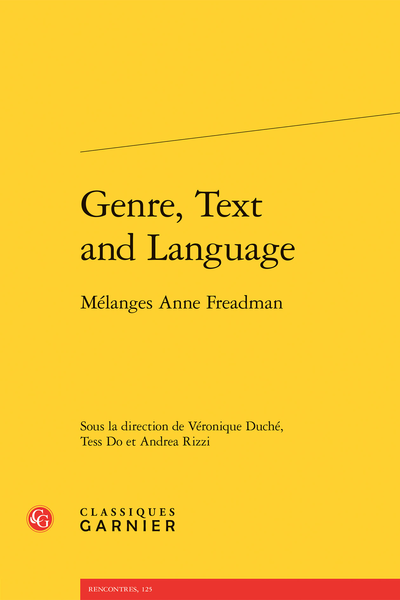
Presentation
- Type de publication : Article de collectif
- Collectif : Genre, Text and Language. Mélanges Anne Freadman
- Auteur : Martínez-Expósito (Alfredo)
- Pages : 7 à 8
- Collection : Rencontres, n° 125
- Thème CLIL : 4027 -- SCIENCES HUMAINES ET SOCIALES, LETTRES -- Lettres et Sciences du langage -- Lettres -- Etudes littéraires générales et thématiques
- EAN : 9782812437960
- ISBN : 978-2-8124-3796-0
- ISSN : 2261-1851
- DOI : 10.15122/isbn.978-2-8124-3796-0.p.0007
- Éditeur : Classiques Garnier
- Mise en ligne : 04/05/2016
- Langue : Anglais
Presentation
It is with much pleasure that I salute this collective homage to Anne Freadman—a homage paid to her by some of the colleagues, students and friends who for many years worked with her and were fortunate to get to know and share some of her many intellectual travails. I was one of those lucky ones. As a young academic who was starting his career, and a new life, in Australia, Anne Freadman was one of my first reference points. She was, of course, one of the most well-known semioticians in the country, and, as I soon learned, one of the very few true believers in the relevance and growing importance of Peirce’s sign theory in an academic milieu which, since the early eighties, had learned to downplay large sections of the critical tradition initiated by the formalists and refined by the structuralists’ legacy. Due to my Spanish training, Saussure was a natural gathering point in my first encounters with Anne (Peirce’s Spanish translations were very rare in those years). I think it was through Saussure that Anne and I realised that we could teach together. Thanks to one of the cyclical crises of languages and humanities departments in Australian universities, our Queensland University department of French, German, Russian, Spanish and Applied Linguistics (affectionally known to the insiders as FRUGALS) was forced to undertake a severe rationalisation of teaching offerings. Anne’s genius came up with some radical, innovative solutions to our financial troubles. Those who knew her well were not greatly surprised by her ingenuity; I was. One of the outcomes of that episode was that Anne and I ended up sharing classes in Gender and Genre, Modernism and European Cinema. For me, that was one of the most inspiring and professionally enriching experiences in my entire teaching career. Not only was Anne an extraordinarily gifted educator who conveyed almost effortlessly a vast array of knowledge through an elegant, persuasive eloquence, but she was, above all, a teacher who had an indelible impact on students’ lives. She possessed that rarest of all
pedagogic abilities, to turn the student’s world view upside down and show him/her how to read into the codes and the signs of a text (an image, a city, a hairdo) in ways that were, always, ever more profond and satisfying and useful. Some of this volume’s contributors were fortunate enough to sit in Anne’s legendary Semiotics class, in which her didactic Holy Grail was, according to many testimonies, at its fullest. At the University of Melbourne, Anne made a substantial contribution to her discipline as the A. R. Chisholm Professor of French. Her intellectual influence, however, was felt well beyond her home department—a point so eloquently emphasised by Ross Chambers in his Foreword to this volume. When I joined Melbourne in 2011, Modern Languages were undergoing a radical curriculum reform—sure, a case of déjà vu. Once again, Anne’s genius exerted a deep influence on our collective thinking on the relation between language teaching and that thing we call language. Her lifelong workings on the pragmatics of genre provided us with the inspiration to persevere with the reform and to implend a myriad of practical ideas in the classroom.
I am most grateful to the editors and to all the contributors to this volume for such a beautiful and timely initiative. Anne Freadman’s intellectual and human contributions during her academic career extended well beyond her home discipline and geographic base; she touched the lives of many of the contributors and helped the careers of most, and for that fact alone we are all deeply indebted to her.
Alfredo Martínez-Expósito
University of Melbourne